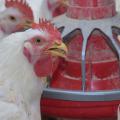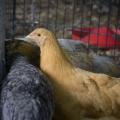Ulcerative Enteritis in Quail
Often quail will lose weight and muscling of the breast before they die. The condition usually exists in various stages within the entire population of birds. The breast bone will lack any muscle covering and seems to be covered only by a layer of skin. The name of the condition is Ulcerative Enteritis, or Quail Disease.
The disease is caused by a bacterial infection in the small intestine of the bird. Ulcers appear and reduce the amount of nutrients that the intestine can absorb. The lack of nutrients causes the extreme weight loss and muscle deterioration.
More information on this disease is available in the Diseases of Poultry publication. It is generally recommended that a preventative drug like bacitracin or penicillin be included in the feed to reduce the incidence of outbreaks. Use of a coccidiostat like monensin has also shown to be beneficial.
Many strains of the disease causing bacteria have been isolated and some strains have shown high resistance to the more beneficial drugs we use. Good management practices will help reduce the severity of these outbreaks. These practices include:
- Keep water troughs clean or use nipple waterers.
- Do not let visitors into the bird producing areas.
- Clean and disinfect all equipment before taking it near the birds.
- Do not bring any new birds onto the premises. If you need to increase flock size, hatch chicks from purchased eggs or eggs you produce.
- Addition of 6-10 lb salt to each 100 square feet of litter or growing area has been reported to reduce ulcerative enteritis outbreaks.
- Maintain a good insect pest and rodent control program to reduce disease spread.
- Wear clean clothes and disinfect footwear before entering quail rearing facilities.
The key point to remember about this disease is that most disease outbreaks are spread by the bird caretaker, not by the birds. Precautions you take to prevent the disease from entering the premises will be much more rewarding than trying to "treat" yourself out of a disease problem.
Publications
News
STARKVILLE, Miss. -- Until an avian flu vaccine for chickens or other alternative is federally approved, commercial poultry operations in the U.S.
STARKVILLE, Miss. -- If egg prices have seemed higher than ever lately, it’s because they are, and consumers can place much of the blame squarely at the feet of the ongoing bird flu outbreak.
With highly pathogenic avian influenza, or HPAI, in the environment in Mississippi, owners of backyard flocks have to take extra steps to keep their chickens healthy.
Avian influenza poses an extremely low risk to human health and none to food safety in Mississippi, but its presence poses a risk to backyard flocks and the state’s $3 billion commercial poultry industry.







